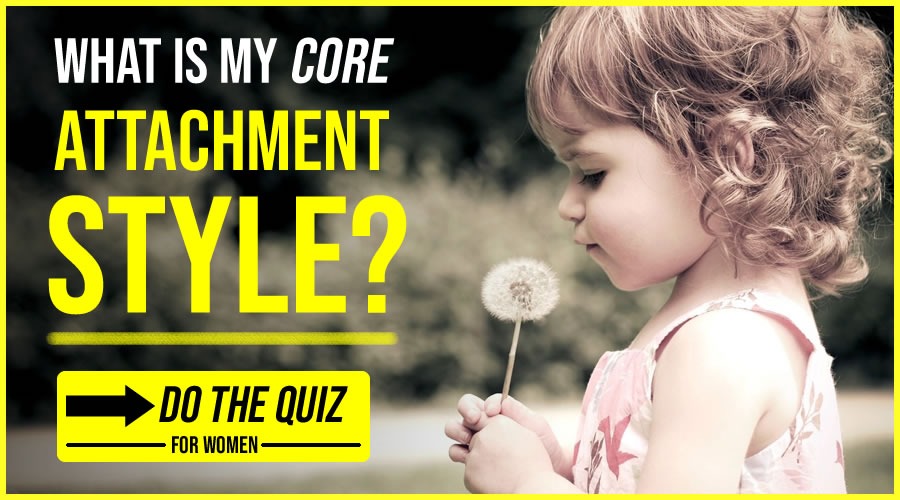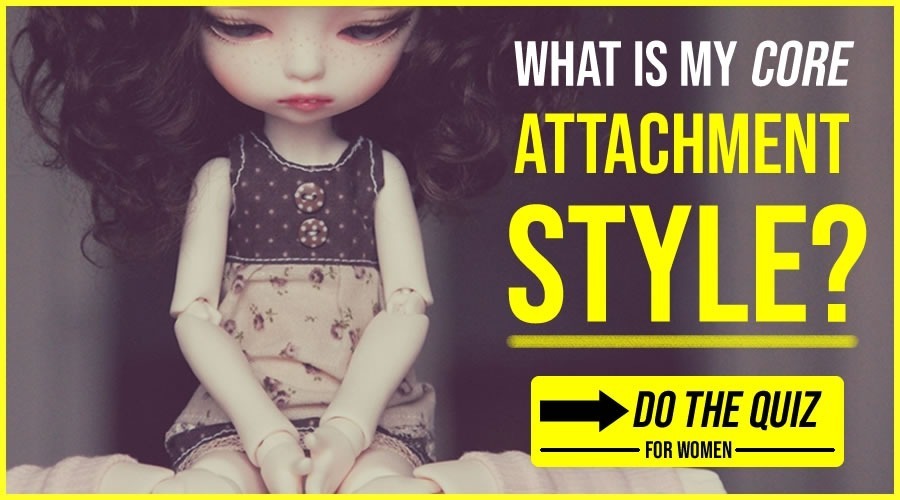NCRW
13 Proven Signs of Attachment Issues in Adults + How to Fix It for Good
Author: Varsha Asrani & Renée Shen
Do you ever feel that you have patterns of responding in unexplainable and erratic ways when committing to a relationship?
Perhaps you know you have some unhealthy behaviors whenever you’re in a committed relationship, yet you don’t know why you’re like that and you can’t seem to stop it.
It can be a clear sign of attachment issues stemming from emotional neglect or trauma in infancy and early childhood.
You know inside your heart that your behavior is not just because of your partner, but it’s your patterns and mindset that stop you from moving forward.
Your past can have a huge impact on how you react to your current and future relationships. You cannot change what happened in the past, but you do have the power to change how it affects you now!
Like any other problem in life, healing of attachment issues can only begin when you:
- Understand why it’s there; and
- Identify and acknowledge its existence.
I know - it may feel a bit overwhelming to feel all this responsibility on your own shoulders, so before you accept that you (or someone you love) has some deep attachment issues, check the following proven signs that reflect attachment issues in adults.
I have listed them in the coming sections but before we peruse them, let me spend some time explaining the two main disorders associated with attachment issues.
Table of Contents
RAD (Reactive Attachment Disorder)
Attachment issues in adults are reflected in someone’s behavior when they get close to someone.
That’s the key here - attachment issues show up when getting close to someone. Hence, you won’t always notice the signs of attachment issues in adults unless and until the person gets close to you, because it is only through intimacy and closeness with someone that their attachment issues will be exposed.
Adults with attachment issues may show minor annoying behavior, or, in the most aggressive cases, their behavior is referred to as reactive attachment disorder (RAD).
Reactive attachment disorder occurs when a child is unable to form a healthy, mutually responsive relationship with their parent or primary caregiver.
People with RAD cannot help but have their past dictate the quality of their future relationships - like all of us.
Only, in the case of people with reactive attachment disorder, their past will cause huge negative damage in their future relationships. Their early emotional neglect affects how they relate and bond with others - or if they bond with others at all.
Disinhibited Social Engagement Disorder (DSED)
DSED used to be considered a sub type of attachment disorder associated with RAD. However, it was recently classified as a separate diagnosis of attachment disorder.
What is DSED?
It is an attachment disorder that is considered pretty rare, but it develops when a child has been shifted from one foster carer to another, from one institution to another, or generally hasn’t had consistent and sensitive nurturing from caregivers.
Most children seek comfort from a familiar parent of caregiver, but children with DSED tend to seek attention, comfort and love from anyone - even strangers.
To receive this diagnosis, children usually need to have been identified to have been neglected in childhood
Though this disorder is usually associated with children, it can still affect adults. In adults it may look like:
- Seeking attention from everyone and anyone.
- Not understanding that certain behaviors and treatment are reserved only for people you trust and are close to
- Giving affection without warmth (empty affection)
- A lack of emotional sensitivity and emotional attachment to others
- Lack of empathy
Now that we’ve established the two main types of attachment disorders in adults, let’s explore the concept of attachment.
We will start by understanding:
- What attachment is and what a secure attachment is
- Looking at the various types of attachment issues
- Establish the proven signs that reflect attachment issues in adults.
Would you like to learn to have the ability to “trade in” your anxiety and insecurities for self esteem, self worth and intrinsic confidence, so that no one will ever take you for granted & high value men will recognise you as an indispensable “keeper”? CLICK here to learn how to have a high value mindset.
What Is Attachment?
Attachment can be defined as a deep and enduring emotional bond between two people in which each seeks closeness and feels more secure when in the presence of the attachment figure.
Each and every newborn baby comes into the world seeking a deep, sensitive and enduring emotional bond with their caregiver.
Unfortunately, it is only the lucky babies who are blessed with hyper responsive and nurturing parents.
What Is A Secure Attachment?
If you had a very emotionally sensitive and attuned mother and father, then you are likely to be blessed with what is called a secure attachment style.
A secure attachment style is a way of relating to others in relationships that shows you are:
- Comfortable with intimacy
- Are emotionally resilient and able to bounce back from adversity
- Deeply believe that you are worthy of love, understanding and belonging
- Feel secure with your place in the family and in the world
- Comfortable with deep attunement and responsiveness in relationships
- Have well calibrated behavior and aren’t prone to exhibiting behavior that pushes others away
- Have deep empathy for the people you are in a relationship with
- You treat others with great respect and empathy
- You treat yourself with empathy
On the other hand, if your caregivers exhibited the following behaviors towards you:
Inconsistency in responding to your emotional cues and needs
- Leaving you to cry as a baby
- Pushed hard for you to be “independent” from infanthood or early childhood
- Dismissive of your emotional needs
- Diminished the value of intimacy and emotional closeness
- Were scared of your emotions
- Neglected you even when you explicitly needed nurturing or help
- Deliberately attacked your self esteem
Then you likely have an attachment disorder and exhibit signs of attachment issues in adults. Let’s discuss these now.
Types of Attachment Issues in Adults
Generally, three categories of insecure attachment lead to adult attachment issues. They are anxious/ambivalent, apprehensive/avoidant, and disorganized attachment.
Anxious/Ambivalent
Also called preoccupied attachment style, people who suffer from anxious/ambivalent attachment issues always crave proximity and closeness - sometimes too much.
Why?
Because their early experiences lead them to believe that they have to always be on alert for threats to their relationship.
Essentially, they aren’t well calibrated in a relationship and tend to be very clingy - all to assuage their deep rooted worry and anxiety.
Their behavior may unknowingly actually push people away. Due to constant underlying anxiety when getting close to people, they behave in highly emotional and insecure ways that damage the connection in their relationship.
Such people fear that they will end up being alone because they deeply fear abandonment, and somewhere deep down inside, they know that their clingyness would scare people away.
MORE: How To Overcome Anxious Preoccupied Attachment: 7 Proven Steps.
Would you like to learn how to use your innate feminine bias for early attachment to create deeper attraction with men and inspire a deeper commitment from him without you looking needy and low value? CLICK here to learn about high value attachment.
Avoidant
If someone suffers from avoidant attachment, they prefer distance as that is what they were trained to value from infancy.
Avoidants feel uncomfortable with getting too close to anyone, because often unbeknownst to them, their own needs for attachment were shunned, ridiculed or worse - completely ignored as a child.
This leads someone to seemingly not care about connection, intimacy and closeness in adulthood. Instead, they reduce the importance of intimacy.
If you’re in a relationship with an avoidant, you may find that they feel that your demands for closeness or intimacy are too suffocating or overwhelming.
Such people also hate dependency. They neither trust nor depend on anyone, and nor would they want anyone else to depend on them.
Disorganized
The final insecure attachment style is disorganized attachment. Disorganized attachment occurs when a caregiver is abusive or violent, and unpredictable.
Related: Disorganized Attachment Style: Beware The 8 Signs You Have It & What To Do.
The disorganized relationship is defined by fear - fear of rejection, fear of being hurt or abused and fear of abandonment. As a child, someone with disorganized attachment starts to develop intense fear and negative emotions towards closeness or getting attached to anyone.
When such children grow up, they commonly suffer from depression or retort to substance abuse. They find it difficult to connect with others and often find reasons to stay away from getting too attached, for fear of feeling, well - fear.
The worst part of suffering from disorganized attachment is that it’s essentially a combination of anxious attachment and avoidant attachment - leading the people with disorganised attachment to feel both great fear and great anxiety.
And so, it is also difficult to treat because such adults often get into a relationship with a preconceived notion that it would eventually result in rejection and hurt.
13 Signs That Reflect Attachment Issues in Adults
Here are the signs of attachment issues in adults:
Sign # 1: Lack of Empathy
Why a lack of empathy?
Because they are too focused on themselves - in the case of those with anxious attachment and those with disorganized attachment, they’re overly focused on their own fears.
In almost all cases where people show signs of attachment issues in adults, there will be a lack of empathy.
But this lack of empathy will manifest to the extreme in those with avoidant attachment, because their attachment and intimacy needs (and all their emotions) are diminished - they may not even notice their own feelings, so how could they notice yours?
Therefore, adults with attachment issues may seem completely cold and will not think twice about speaking hurtful things.
Would you like to learn to have the ability to “trade in” your anxiety and insecurities for self esteem, self worth and intrinsic confidence, so that no one will ever take you for granted & high value men will recognise you as an indispensable “keeper”? CLICK here to learn how to have a high value mindset.
Sign #2: They Balk At Intimacy
This is again, especially true for adults with avoidant attachment, and will also show up to a lesser degree in adults who have anxious attachment and disorganized attachment.
Adults with attachment issues develop a reluctance to get emotionally or physically close to anyone.
This doesn’t mean that they will never ever be intimate, as adults with anxiety still manage to relax and enjoy emotional and sexual intimacy at times.
But being emotionally intimate will be especially difficult for adults with attachment issues, because of what closeness and intimacy represents for them - anxiety, fear and ultimately getting hurt.
This avoidance of intimacy affects their ability to establish and maintain long-term close relationships. Sometimes, they might even unconsciously create altercations, making it difficult for the other person to stay with them.
Sign #3: Fear of Commitment
Why commit when all you’ve known is betrayal, hurt and having your attachment needs dismissed?
People with attachment issues often believe consciously or unconsciously that their relationship is doomed to fail.
To keep themselves from getting hurt repeatedly, they try to avoid any sort of commitment. Delaying to move ahead in a relationship or creating situations leading to break-up are common signs that depict their fear of commitment.
Sign #4: Self-Loathing
Why self loathing? Because as a child, their very natural attachment needs (that every single human is hardwired to have) were dismissed or neglected, and so these people internalised their parents’ lack of responsiveness and sensitivity to mean that they are inherently wrong, horrible or shameful.
This self hatred makes it very hard to get close to these people without great effort or pain.
Sign #5: Addiction.
Addiction is a distraction from real intimacy - which we’ve already established that adults with attachment issues struggle with, or are not capable of.
One of the proven signs of attachment issues is a dependency on drugs or other distractions.
People often find comfort in developing addictive habits such as smoking, drinking, eating sugar, or doing drugs. Since such people do not have positive ways of regulating their emotions, they develop addictions as a distraction.
Once the addiction habit is created, it’s notoriously hard to break.
Sign # 6: Dependency Issues
If you find it difficult to depend on your partner for anything and hate it when they depend on you for something, then you may have attachment issues.
Dependency is kind of a pre-requisite for close relationships in one way, shape or form. This type of dependency feels natural for those people who are securely attached, but it can induce avoidance, rejection or even panic in those who have insecure attachment.
Sign #7: Trust Issues.
If you couldn’t even trust your mother and father (or other caregivers) to respond to your basic emotional needs as a baby, then what would that inspire you to feel?
Distrust, of course. And that is, a general distrust for other humans and relationships in general.
Babies come hardwired with basic emotional needs - and although they are basic, they can be very extreme in terms of how much they demand from a parent.
A lot of parents are simply too stressed, too overworked, perhaps too ignorant (and have bad influences in their parenting life) or are struggling too much financially to be able to provide adequate responsiveness to their children.
In the worst cases, where parents completely neglect their child and ignore them, leaving them to cry alone for hours, this will promote the most extreme for of attachment style - the avoidant attachment.
Would you like to learn how to use your innate feminine bias for early attachment to create deeper attraction with men and inspire a deeper commitment from him without you looking needy and low value? CLICK here to learn about high value attachment.
Sign #8: Full of Negativity.
Why are adults with attachment issues full of negativity?
Because their childhood has given them beliefs about relationships, life and people that centre around fear and being small.
Being positive or having hope can feel risky for those with reactive attachment disorder - and so to keep aligned with their attachment style, they naturally adjust their belief system.
This negativity isn’t just reserved for other people and relationships in general - it is focused upon themselves, too.
In other words, they have a negative view of themselves.
Why?
Because people with attachment issues aren’t resilient - and they haven’t been resilient since their childhood. Since childhood, they have limited their:
- Exploration of the world
- Their bravery
- Their trust in life
- Their investment in any relationships or skills
- And these habits carry over into adulthood.
Sign #9: Strong Belief That Every Relationship Would Fail.
Since they do not perceive attachment as a positive and fulfilling experience (on account of neglect in their childhood), they don’t believe their relationships with anyone would ever be successful.
In their mind, relationships don’t last - are temporary - or are simply transactional.
They predict that every relationship will end up in rejection. They fear that such an outcome is inevitable, so they adopt behaviors that sabotage any possibility of endless love.
Sign #10: Low Self-Respect.
In line with self loathing, having little to no self respect is a consequence of insecure attachment, because no one fully respected them and their feelings while growing up, so they carry over this treatment in adulthood.
How can you respect yourself and your own needs and boundaries when your own caretakers didn’t?
Our parents teach us how to treat ourselves and how to treat others. When our parents have been dismissive or avoidant of forming a deep emotional bond of trust with us from day one, then we learn that we are not worth very much, and behave in ways that are congruent to that belief.
Sign #11: Excessive Jealousy.
Anxiously attached people are very emotional and prone to jealousy because they tend to see a lot of their partner’s innocent behavior as a threat to their emotional safety in the relationship.
They will feel jealous if their partner spends too long talking to a member of the opposite sex, for example, because they are always on alert and worried that they would be abandoned at any moment.
Since such individuals have not seen healthy relationships, witnessing the good family conduct of their peers could also ignite jealousy which will also affect their relationships.
Sign #12: They Are too Possessive.
It’s pretty normal to feel a healthy possessiveness of your partner in the face of a genuine, severe threat.
However, it’s not normal to feel constantly possessive when there’s no genuine threat of losing your partner’s affection or having your partner be poached by another suitor.
But those with insecure attachment are more prone to feeling excessively possessive and to always be checking up on their partner for no good reason.
What would you do if you were always on edge, secretly feeling unworthy and worried about losing your partner?
You’d probably become overly possessive of those you love - or even go a little crazy, wouldn’t you?
Being ignored and neglected during childhood makes individuals too wary of loss.
Sign #13: They Show Signs of Mental Health Problems Such as Anxiety or Depression.
This is one of the key signs of attachment issues in adults.
To put it simply, people with attachment issues often fail to balance their emotions, because no one gave them that gift or balancing emotions for them in their childhood.
All babies and children need good role models and good nurturing in order to learn the skill of self regulation, but many do not get this privilege. Thus, emotions tend to go unchecked, unexplored and can even become out of hand in individuals with attachment issues.
As mentioned earlier, substance abuse is a common response which exposes them to developing mental health issues.
These mental health problems tend to manifest themselves in the form of:
- Sudden mood changes
- Anxiety
- Depression
- Unpredictable behavior
- Intense response to routine change, etc.
All of the above are some of the common signs indicating an attachment disorder.
How to Deal with Attachment Issues in Adults and Fix it for GOOD?
To effectively treat people showing signs of attachment issues in adults, we must help them confront the unpleasant and traumatic memories of their childhood that have triggered it. Constructing an explanation for what transpired is important for this.
A child’s sense of self is heavily influenced by how their caretakers see them. Whether or not parents intended to transmit the message that their children are intrinsically imperfect and undeserving of love, children are likely to believe this message and carry it into adulthood.
Adults must tell a new story to forgive their caregivers and realize their actual worth.
Then, they must learn new patterns and behaviors that represent this new understanding, such as how to interact honestly and freely with romantic partners.
They must learn these new patterns and behaviors. Adults who grew up without a role model for good relationships need to create their own “model” for how to interact with others.
You should realize that it may take time and discomfort to learn to open up to others and offer and healthily receive affection. Change might take time and extra effort - even when you don’t feel like making the changes.
For anyone suffering from it or noticed the signs of attachment issues in adults, here are some things you can do to ease it for yourself or others:
#1: Recognizing is The First Step.
A lack of continuous comfort or responsiveness from your caregiver throughout infancy is likely to have contributed to a less secure attachment for you as a child.
Adults who grew up with an insecure attachment as infants typically struggle to comprehend their own and others’ emotions, making it difficult to form and maintain meaningful relationships.
These people may have difficulty relating to others, avoid intimacy, or become overly clingy, afraid, or worried in a relationship because of their mental health issues.
Of course, our relationships are shaped by our experiences as children and young adults. When it comes to adult relationships, recognizing your attachment style might provide important hints as to why you’re having difficulties.
Here’s an article that will help you recognize your attachment style: The 4 Types Of Attachment Styles & Which One Are You?
Furthermore, you should answer the following questions to help you recognize whether you have attachment issues or not…
Do you push people away? Do you have a deep fear that you’re unworthy of love and believe that you’ll be abandoned?
Or do you simply not want intimacy and are deeply uncomfortable with empathising with people?
Alternatively, you may have a hard time establishing meaningful relationships in the first place.
If your answer to any of these questions is a yes, then you need to pause and look deeper into the issue.
# 2: Move Forward With Treating Yourself Or A Loved One.
The following are some suggestions for assisting yourself or someone else with an attachment disorder...
- Make a sincere effort to gain a better understanding of attachment styles and disorders
- Notice your own feelings and be intentional about it
- Process through any anger and hurt over your parents, and do it daily as a cleansing activity.
- When others communicate their feelings, pay attention, and be open-minded
- Avoid using violent language or calling someone a name
- Ask your partner how you can help them the most, and do it with specificity
- Make sure your integrity and personal needs are protected by establishing appropriate boundaries in your life
- You and your companion should express thankfulness regularly
- Intimacy-building activities should be pursued
- Think about going to a couple’s therapist
#3: Seek Professional Therapy.
There are numerous options for those in need of professional mental health assistance. It is possible to get economical and convenient internet therapy for attachment disorders and many other conditions.
Professional therapists may assist you in recognizing the signs of attachment issues in adults, healing from childhood trauma, developing coping mechanisms, and altering any negative thought patterns you may have picked up along the way.
As an added convenience, you can have online sessions with your counselor from the convenience of your home or any other location where you have access to the internet.
Final Thoughts
Whether you suspect your partner of having attachment issues or if you feel that you are the one who exhibits such traits, it is important to identify them and fix them for good.
Acknowledging and facing your fears and feeling your emotions rather than avoiding them are the first steps towards improvement.
I hope that this article helps you gain a better insight into understanding attachment issues and helps you deal with them with great courage.


Varsha is a writer and mother of a beautiful son. She has a dual Master’s degree in Business Management (Finance & Marketing) and Career Counselling certification. Her passion for learning led her to the teaching domain, where she shares the knowledge she gained over the years through education and personal life. She teaches students of ATMC College Melbourne (as a Management Faculty).
Varsha Asrani
Author For National Council for Research on Women
Renée Shen
Author & Editor For National Council for Research on Women. Founder of the popular women's dating & relationship advice website, The Feminine Woman.
P.S. I hope you've enjoyed this article. Here are some other articles that I think you'd really like too...
The 4 Types Of Attachment Styles & Which One Are You?
Dismissive Avoidant Attachment: What Is It & 7 Obvious Signs
© Copyright National Council for Research on Women. All Rights Reserved


